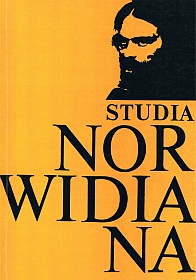Rzecz o wolności słowa jak o problem genologiczny
Abstrakt
Norwid’s long poem Rzecz o wolności słowa is genologically a complex structure, with a truly enormous range of possibilities. This means that the piece is rich in constructional forms and also that no single genological concept can be assigned to it; the work eludes unequivocal identification. Rzecz o wolności słowa is neither a poetic treatise, a learned poem, an epic, a romantic poem, nor a humanistic poem, etc., even though many elements of each of the above can be found in it. The poem shows Norwid demolishing all kinds of petrified schemata of literary genre. Does it follow that all attempts to uniquely classify Norwid’s piece are doomed to failure? By no means. But the question has to be considered in terms of genological forms or tendencies rather than specific genres, all of them designed to constitute a coherent artistic whole. Its backbone is, I think, the binary principle. Rzecz o wolności słowa is dominated by two interwoven elements, those appropriate to the treatise and the epic. The former is co nnected with such features as discursiveness, rhetoric, persuasion, plotlessness, conceptual style, objectivity and, in terms of composition, the theory of the word. The latter is connected with thematic openness, totality of represented reality, subjectivity of some parts (especially Ch. XIV), Frequent use of the excursus and the fragment, presence of narrative and historiosophical elements, and with the history of the word. Constant tension between the two major tendencies creates novel artistic qualities. The incessant friction and mutual interpenetration of epic structure and treatise structure give Rzecz o wolności słowa its poetic force.
Copyright (c) 1993 Studia Norwidiana

Utwór dostępny jest na licencji Creative Commons Uznanie autorstwa – Użycie niekomercyjne – Bez utworów zależnych 4.0 Międzynarodowe.





